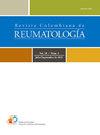拉丁美洲自身免疫性风湿病患者COVID-19不良结局的风险预测因素:厄瓜多尔和墨西哥的一项多中心研究
Q3 Health Professions
引用次数: 0
摘要
在拉丁美洲,对自身免疫性风湿病(SARDs)患者中COVID-19进展的了解仍然有限。本研究旨在确定与急性呼吸窘迫综合征患者COVID-19预后不良相关的风险预测因素。材料和方法一项多中心观察性研究,包括来自厄瓜多尔和墨西哥的急性呼吸窘迫综合征患者。结果共纳入103例患者(78%为女性),年龄52.5±17.7岁。最常见的SARDs是类风湿关节炎(59%)和系统性红斑狼疮(SLE;24%)。入院时,28%的患者出现严重的COVID-19, 43%的患者在随访期间出现并发症,8%的患者最终死亡。抗磷脂综合征(27%)或SLE(20%)患者的死亡率最高。不良预后因素包括急性呼吸窘迫综合征(比值比[OR] = 17.07)、入院时严重的COVID-19 (OR = 11.45)和存在SLE (OR = 4.62)。在多变量分析中,SLE成为死亡率的唯一预测因子(OR = 15.61)。结论拉丁美洲的SARDs患者面临COVID-19不良结局的显著风险,SLE是死亡的主要危险因素。本文章由计算机程序翻译,如有差异,请以英文原文为准。
Risk predictors for adverse COVID-19 outcomes in Latin American patients with autoimmune rheumatic diseases: A multicentre study in Ecuador and Mexico
Introduction/objectives
The understanding of COVID-19 progression among patients with autoimmune rheumatic diseases (SARDs) in Latin America remains limited. This study aimed to identify risk predictors associated with poor outcomes of COVID-19 in patients with SARDs.
Materials and methods
An observational multicentre study including patients with SARDs from Ecuador and Mexico.
Results
A total of 103 patients (78% women), aged 52.5 ± 17.7 years, were enrolled. The most prevalent SARDs were rheumatoid arthritis (59%) and systemic lupus erythematosus (SLE; 24%). Severe COVID-19 was observed in 28% of patients at admission, 43% experienced complications during follow-up, and 8% ultimately died. Mortality rates were highest in patients with antiphospholipid syndrome (27%) or SLE (20%). Poor prognostic factors included acute respiratory distress syndrome (odds ratio [OR] = 17.07), severe COVID-19 at admission (OR = 11.45), and presence of SLE (OR = 4.62). In multivariate analysis, SLE emerged as the sole predictor of mortality (OR = 15.61).
Conclusions
Patients with SARDs in Latin America face significant risks of adverse COVID-19 outcomes, with SLE being a major risk factor for mortality.
求助全文
通过发布文献求助,成功后即可免费获取论文全文。
去求助
来源期刊

Revista Colombiana de Reumatologia
Medicine-Rheumatology
CiteScore
0.80
自引率
0.00%
发文量
92
期刊介绍:
The Colombian Journal of Rheumatology (Revista Colombiana de Reumatología) is the official organ of the Colombian Association of Rheumatology (Asociación Colombiana de Reumatología) and the Central American, Caribbean and Andean Association of Rheumatology (Asociación Centroamericana Caribe Andina de Reumatología) - ACCA. It was created in December 1993 with the purpose of disseminating scientific information derived from primary and secondary research and presenting cases coming from the practice of Rheumatology in Latin America. Since its foundation, the Journal has been characterized by its plurality with subjects of all rheumatic and osteomuscular pathologies, in the form of original articles, historical articles, economic evaluations, and articles of reflection and education in Medicine. It covers an extensive area of topics ranging from the broad spectrum of the clinical aspects of rheumatology and related areas in autoimmunity (both in pediatric and adult pathologies), to aspects of basic sciences. It is an academic tool for the different members of the academic and scientific community at their different levels of training, from undergraduate to post-doctoral degrees, managing to integrate all actors inter and trans disciplinarily. It is intended for rheumatologists, general internists, specialists in related areas, and general practitioners in the country and abroad. It has become an important space in the work of all rheumatologists from Central and South America.
 求助内容:
求助内容: 应助结果提醒方式:
应助结果提醒方式:


